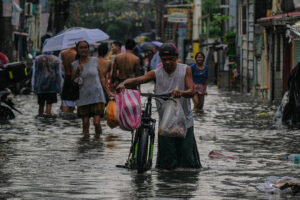
Public Works department flags 421 ‘ghost’ projects after nationwide audit

THE GOVERNMENT has found 421 “ghost” infrastructure projects across the Philippines after validating about 8,000 public works, the Department of Public Works and Highways (DPWH) said on Thursday, marking one of the biggest corruption red flags uncovered under the Marcos administration.
“Out of the 8,000 projects validated nationwide, 421 were confirmed as ghost projects,” Public Works Secretary Vivencio B. Dizon told a livestreamed news briefing. The projects were validated by the Armed Forces of the Philippines, Department of National Defense and Department of Economy, Planning and Development.
The findings are part of an expanding probe into irregularities in flood control projects, which have drawn scrutiny from the Independent Commission for Infrastructure (ICI). The DPWH is working with the ICI, military and police to trace possible fund diversions and determine accountability.
ICI Executive Director Brian Keith F. Hosaka said the commission is reviewing procurement thresholds to curb public fund misuse.
“At present, the district level has a P150-million limit for civil works procurement, while the regional level holds a P400-million threshold,” he told the same briefing. “The ICI’s suggestion is to split these limits in half so we can better control DPWH civil works procurement.”
The audit and review come as the Marcos administration intensifies its anti-graft campaign following public outrage over fake infrastructure projects allegedly funded through congressional insertions.
Mr. Dizon said both agencies would tighten validation systems to prevent ghost projects from being approved or paid in future budgets.
Meanwhile, Senator Sherwin T. Gatchalian said he favors abolishing the DPWH and replacing it with an infrastructure agency, citing the lengthy process required to reform the existing department.
In a news briefing, the lawmaker said the government should consider overhauling the DPWH, including the dismissal of all its officials, to eliminate corruption in the agency.
“It’s not just limited to Bulacan — it’s happening across the entire Philippines,” he said in Filipino, referring to bogus flood control deals in the central Luzon province. “That means there are corrupt DPWH officials nationwide. How do you clean that up?”
The DPWH is seeking tougher enforcement and harsher penalties for erring contractors, Mr. Dizon told reporters earlier this week.
“We need to be stricter and impose heavier penalties for blacklisting, because things are still too lenient,” he said on the sidelines of an event. “We have to make it as stringent as, if not more stringent, than the World Bank and Asian Development Bank (ADB).”
The World Bank and ADB have an agreement to jointly blacklist contractors involved in fraud or corruption across their projects. In the Philippines, the Department of Budget and Management earlier warned that contractors, suppliers and consultants repeatedly violating procurement rules could face lifetime blacklisting under the proposed New Government Procurement Act.
The Court of Appeals earlier froze another batch of bank accounts linked to the flood control scandal, raising the total value of restrained assets to P4.4 billion, the Anti-Money Laundering Council said on Wednesday.
The latest freeze order covers 12 more bank accounts connected to persons of interest, including an entity whose license was allegedly used for “ghost” infrastructure projects, the council said in a statement. It did not identify the account holders.
In the past month, the appellate court issued five separate freeze orders covering 1,632 bank accounts, 54 insurance policies, 163 vehicles, 40 properties and 12 e-wallets tied to the scheme. Each order takes effect immediately for 20 days and may be extended by up to six months.
President Ferdinand R. Marcos, Jr. earlier said corruption cases tied to infrastructure spending must be backed by solid evidence, warning that weak filings could lead to failed prosecutions.
“We have to follow the law, otherwise whatever we do is not legitimate,” he said in a podcast released by the Presidential Communications Office on Sunday. “We know many of these people are not innocent. But if you’re going to bring them to court, you must have a very strong case.”
He said incomplete evidence could result in dismissals, which he described as “much, much, much worse.”
The DPWH is under mounting scrutiny over multibillion-peso anomalies in flood control projects, where state funds were allegedly siphoned off by contractors and officials. — Erika Mae P. Sinaking andA.R.A. Inosante



